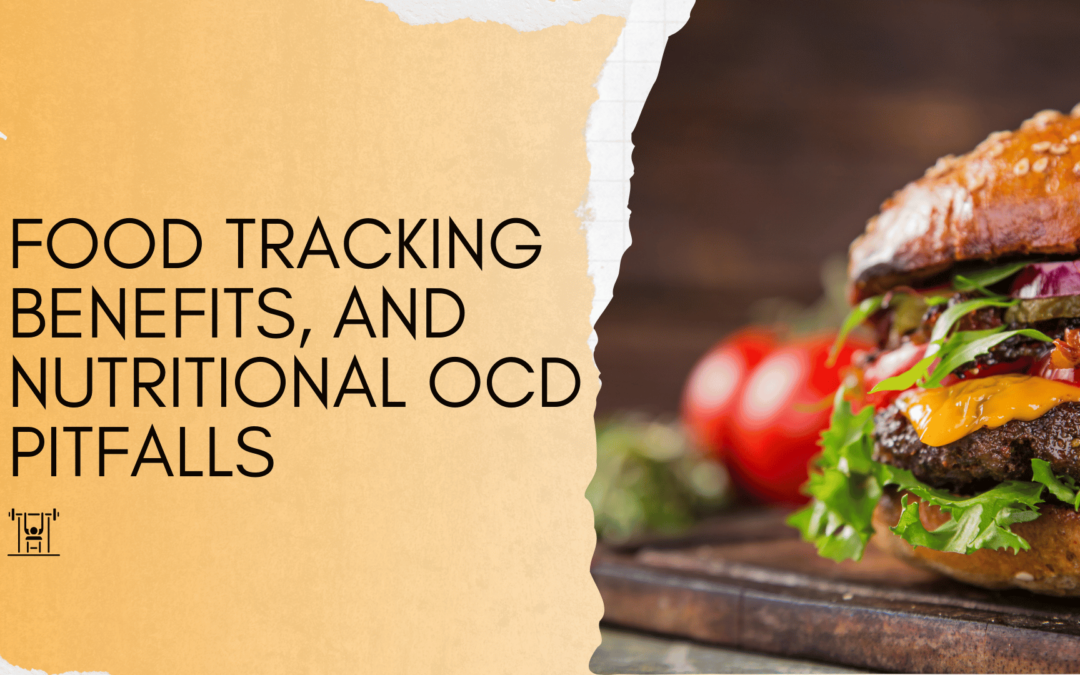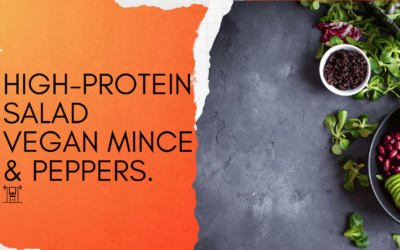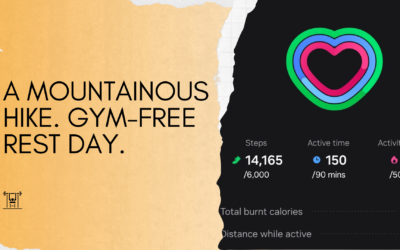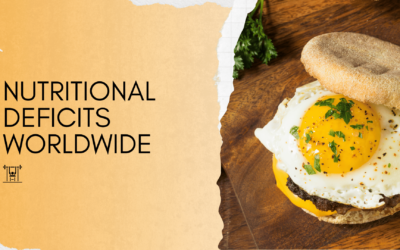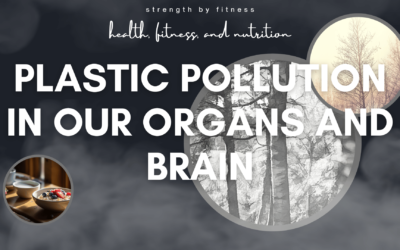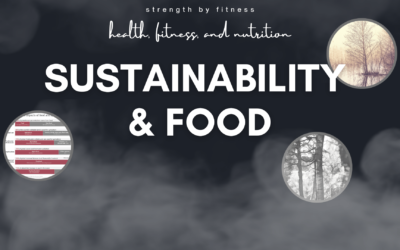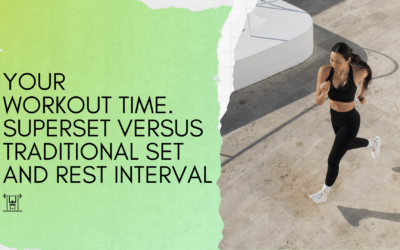
Strength By Fitness
Brand New Article: Food tracking benefits & nutritional OCD pitfalls.
Now, in a recent podcast version of my article “Protein Et Al” ( read this Protein Et Al on Medium by clicking here, or head on over to our article library to read it right here at Strength By Fitness ), I mentioned that hardly anyone should waste their time & energy trying to track their actual nutritional intake.
Saying stuff like this can ruffle some feathers and cognitive zen minds, so I thought that I would sit down and write a proper follow-up to this podcast, and elaborate upon what exactly I meant with that.
Tracking foods in a food journal can be an amazing reality check that helps to right your trajectory.
You see, if you have never, ever sat down and actually taken an honest view of what you eat, and how much you eat in not just one meal. But during the course of an entire day & week, well then it is about time that you do so, just make sure to include all the things you drink as well.
This is an incredibly useful tool, but not the way most people might think.
Food tracking is not about jotting down every single nutrient you eat and adding it all together per meal, day, and week, all year round.
You can certainly do that.
It is ok to obsess about every food label, snap photos, and track every macro & micro nutrient in food journaling apps or jot it down in whatever note-taking app you prefer.
Embrace it if you like it.
You can 100% track your every calorie and nutrient and report back to your coach, or personal trainer, or just obsess about it for your own sake. It´s all good if this makes your world spin.
Even more so, it is absolutely wonderful if you enjoy doing this, and if it provides the structure and order that you need, and enjoy to keep yourself on track with your healthy fit lifestyle, just keep at it and be happy..

Nutritional labels are never accurate, they show you a trajectory, not the precise nutritional reality of your food consumption.
The issue with the OCD-style food tracking approach is that tracking nutrients is not an exact science. There are no food labels in the history of humankind that have managed to correctly specify exactly how much protein, fats, carbs, fibers, omega 3 & total energy you will end up eating.
This also means that there isn’t a single app available that will manage to properly keep track of your nutritional intake, or display the actual nutrients in any single meal or food item it has in its database.
This is perfectly fine, however.
Sure, I know, plenty of apps and coaches claim to provide exactly that, but that´s not the case. It´s simply a rough estimation that will be a bit off with every meal, individual ingredient, and food item.
Despite this inaccuracy, knowing the vague nutritional landscape of each food item you include in your life is more than enough to tell you what foods are healthy, high-protein, nutritionally complete, low fat, moderate carbs, filled with added sugar, or loaded with high-quality fibers and carbohydrates.
And this is all you need to make informed choices that will push the trajectories of your health, body composition, endurance, cardiovascular health, fat mass, strength, and muscle mass in the right direction.
You can still track your nutrients if that provides meaning and progress for you.
You can still track all your nutrients if that provides meaning and progress for you. It´s just never going to be exact, and sometimes it is going to be drastically outside the actual ballpark.
But that data is ok, and useful enough because it provides a rough approximation of how nutritionally sound you are eating. This vague sense of direction will let you shape a better food trajectory even though it is not exact and correct by the numbers.
This simple reality is however why I never, ever track my own nutrients.
I check nutritional labels when I make, or consider making new food choices because a quick look tells me if it’s going to be a nutritionally healthy and good enough quality food choice that I will want to include in my healthy fit life, or if it is not up to par and as such, something which I will kick to the curb before I even try it.
Not because the information is exact, it never is, but because it tells me the trajectory of the nutrients. Ie, is this meal or food item high in fat content, is it low-fat, or high-protein, is its energy somehow delivering abysmal amounts of protein, or does it provide good-quality carbs, and fibers, is the fat content good essential fats or just worthless fats, too much salt and low-quality carbs and added sugar that’s been merged together to make it an utterly hedonistic piece of unhealthy food crack.
Food apps & labels tell us if there is any b12 and omega 3 in the food we are eating or not, and so on.
As such I can see right away if something has earned a place in my life or not, and I can tell right away if it will add to high-protein, high-satiety, and nutritional completeness to my food life or not.
If it doesn’t it´s a no-go for me, personally.
But you might be different, just as how every client I ever worked with has their own unique food blend. But make high-protein the main food pillar.
Build around that, and keep your fiber intake as high as you enjoy it, add good quality foods to this that cover all the nutrients you need, and you are good to go, despite not keeping an exact eye on the total nutrients you consume on a daily basis for the rest of your life.
That is the benefit of having food labels or apps that provide nutritional information.
Not because it’s an exact number, but because it lets you know if it is good, high-quality food with good essential fats, high-protein content, high-fiber content, and good quality carbs and micronutrients, or if it is just another piece of junk food with tons of low-quality carbs, bad fats and too little protein, micronutrients and fiber to bother with, and just way too much energy and no satiety and nutrition at all to talk about.
The helpful difference between food tracking and nutritional ocd.
Personally, as a coach & healthy fit living die-hard enthusiast of many decades, I really see no need to keep track of macro and micronutrients, not for myself or our clients. I do however see immense benefits from knowing how healthy the foods you eat are, both for me and my wife, and our client’s sake.
Nutrition is essential for your progression in health, fitness, and body composition. So we need to make good quality food choices, and in order to do so we need to be aware of what we actually eat, the food items and their nutritional makeup, and the volume of what we actually eat and drink.
But, we already get all the food and nutritional data we need from keeping it easy, and simple, data that will be just as good, accurate, and useful as the biggest die-hard nutritional OCD tracker ever.
I have in other articles over the years held up protein as the number one nutrient, and this holds truer than ever.
Make protein the number one food pillar in your life.
But other than choosing high-protein food items and constructing high-protein meals you will gain no real-life benefit or even accurate information from trying to track the exact nutritional content of your meals, its an impossibility due to the variability in nutritional content even in whole foods, and there is no way to correctly measure the exact nutritional content of any food.
So this is my proposal.
Track the foods you eat over a week. The volume of the foods you eat, what you drink, and how much. Take a look at the approximate nutrients of those foods, assess and adapt.
The goal should be to pile up daily and weekly foods, all-year round that allow you to consume as much high-protein foods as possible. And if that protein is accompanied by low-fat or high-fat, moderate, low, or high-carb foods, that’s all up to you, and your food preference.
Real-quality carbs are perfectly fine, and they benefit the outcome of many exercise routines, such as lifting weights and highly intense martial arts more than low carb diets do, but junk carbs aren’t ok.
So this healthy, fact-based food approach has nothing to do with food and diet tribes, it is the complete opposite because it’s about the actual reality of our food life.
You can do the high-protein approach on keto, you can do IF, be a vegan or carnivore. That’s your choice.
Just make protein the number one food pillar.
Speaking of protein
This is the healthy high-protein intake range you should aim for.
Omnivores should aim for a protein intake range of 1.6–2.0 grams of protein per kilo of bodyweight if already fit.
All while obese and very overweight individuals should keep the same range but base it around their target weight.
For plant-based people, the range becomes 1.8 as the minimum, up to 2.0/2.2. This is due to plant-based foods needing higher total intake to reach the same amino acid saturation, strength, and lean muscle mass progression due to our bodies having slightly lower protein absorption from plant-based foods.
There is no hard-coded upper stop.
But almost no humans need to consume more than roughly 2.0 grams/kilo/day. Its absolutely safe to eat as much as 3.0 grams of protein, but the more protein you eat the less room you get for other needed nutrients. So the 1.6 to roughly 2.0 range works incredibly well for all intents and purposes on pretty much every human being on the planet.
Take a look at my protein et al article if you need more in-depth thoughts and facts on protein, as well as a ton of cited studies on health outcomes, and fitness progression due to high-protein consumption.
I am plant-based, strong, healthy and fit. But your diet tribe is not a factor.
I prefer whole plant-based foods to go together with my high-protein consumption. As such my high-quality carb & fiber intake is way higher than a keto person, or your average carni or omnivore. But your food tribe and preference do not matter, and it changes nothing about what I am saying here in this article. No matter your preferred food plan it can be made to be nutritionally complete and as such, nothing but health and fitness-friendly.
Once you know how much you eat, and what you are eating you can easily go on to adjust your weekly food habits. Nudge out the food items that contain low-quality carbs, added sugars, and too many non-essential fats, and just plain too much quick energy, fat & salts combined. These foods provide the least amount of protein, satiety, and micronutrients, and they usually provide the most energy too.
Making a general adjustment like this will provide tremendous health and body composition benefits for anyone.
No matter current body composition, fitness level, and metabolic health status.
Some foods will enter your healthy fit life, while some will be barred for life.
As you nudge the above out of the picture, together with nudging alcohol and sugary beverages out the door. Bring in, and embrace the quality foods that you enjoy, foods that are rich in protein & whole plant-based fibers and nutrients.
Yes, even as a keto and or carnivore person, the more whole plant-based foods you include together with your animal protein foods, the better off you will be.
Better satiety, better micronutrients, less hunger, leaner body, better health metrics.
Easy as pie and no perpetual food or nutritional tracking needed to excell.
Obsessing about one’s exact nutritional intake is a fruitless endeavor and borderline OCD.
The reality of what I said above is why I can happily state that obsessing about one’s exact nutritional intake is a fruitless endeavor and borderline OCD in the fact-based light that it’s pointless and inaccurate to do.
All while stating that you should 100% track your food intake if you never have, once done, assess and adapt truthfully, breathe out, and relax knowing that you are now ready to eat healthy, and nutritionally complete for all of life while you slay every single body composition and fitness goal you have, all while your health metrics will continue to improve.
Doing this simple thing for a few days to a week will allow you to take control and make some serious adjustments to your trajectory in health, well-being, fitness, fat mass, and body composition.
Following this you just take a look at whatever new foods you consider to bring into your life. Repeat this procedure as often as you feel the need to do so. Perhaps you have shed a ton of body fat, or you have gained a ton of muscle mass, these things usually don’t require a new food diary since you simply assess and adapt your food intake according to your progression in body mass and fitness progression.
Repeat as often as you need to. Your ongoing habits need to fit you after all.
But you might feel that you need it, if so, repeat as often as you wish.
But isn’t this easy-to-do food approach a huge relief if you are honest?
Because, at the end of the day, what is the point of spending time and energy on something that will never provide any meaningful and accurate data points? Especially so when the simple act of choosing high-protein foods with plenty of fibers from whole plant-based foods to complement whatever protein sources you prefer will provide you with the best possible trajectories in health, fitness, recovery, aging, and body composition already.
Well, you already know my answer to the rhetoric question above. Let me know what your train of thought landed in once you have given it a proper consideration.
But before I let you go, a quick reminder.
It is ok to count calories and track every macro, and micronutrients if that is what makes you and your health journey work.
It´s not needed, nor accurate, however, but it’s ok and it too works, and we are all unique in what we need to feel in control as we maintain our healthy fit journey across our entire health span.
Thank you for reading, you can also read our paywalled articles on Medium if you prefer that option.
Cited studies
There are no studies cited specifically for this article. But here are some fresh studies on creatine and its positive impact on our bodies, mind, health, aging, fitness and cognitive health.
1. https://cdn.nutrition.org/article/S2475-2991(23)26595-6/fulltext
2. https://www.scopus.com/record/display.uri?eid=2-s2.0-85079605640&origin=inward&txGid=b6093d7aa06b7092dfa6efcc9588e4b1
3. https://www.frontiersin.org/journals/nutrition/articles/10.3389/fnut.2024.1424972/full?s=09
4. https://academic.oup.com/nutritionreviews/article-abstract/81/11/1497/6987897?login=false&s=09
5. https://pubmed.ncbi.nlm.nih.gov/35984306/?s=09
6. Creatine in Health and Disease – PubMed (nih.gov)
strength by fitness
podcasts
recent articles
Plant-Based High-Protein Recipe: Pepper, Mince Salad.
This is one of Strength By Fitness plant-based high-protein meals. A tasty high-protein salad with peppers and vegan mince. 70 grams of protein, from 3 different protein sources, nutritiously rich and satiating.
Recipe Strength By Fitness.
Our mountainous hike on our gym-free Saturday.
Saturday is one of our weekly gym-free recovery days. This means that we prioritize ‘us’ time, chilling, relaxing, recovering, eating healthy high-protein foods supplanted with plenty of whole plant-based foods, and doing nonexhaustive activities that are done for adventure, fun, family, relationship, calm, rejuvenating and quality of life time.
Our world suffers both obesity & nutritional deficits.
Around the world, billions of people eat too much food while at the same time not getting enough nutrients. But how bad is the situation really?.
Let us look at some nutrients and how many are estimated to be deficient globally right now.
The relentless onslaught of plastic pollution.
Globally speaking, this disregard for cause & consequences becomes even more apparent in the way far too many still do not acknowledge the importance of a healthy planetary home and the fact-based suffering and harm we are causing both ourselves and our planet by our refusal to live in a sustainable way.
The blood-brain barrier and plastic pollution.
So, following this short introduction I have drummed up, we have finally arrived at the core of my article. Man-made plastic pollution and the way it encapsulates everything in our earthly home by now.
Even our brain.
Nutritional Coaching + Sustainability. This is why they need to go hand in hand.
Strength By Fitness Sustainability & Nutritional Coaching Needs to Walk Hand in Hand. This is a 5-minute-read on Why that is. Welcome to another fact-based article from Strength by Fitness. I have for the past 15 or so years of talking about, writing, and coaching...
A fact-based conversation on the subject of supersets versus a traditional set approach.
The agonist-antagonist super set is capable of cutting your workout time in half without falling too far behind the strength progression of a traditional workout plan. But, you can also make use of the way I do, which allows you to cram more high quality workout volume and sessions per week into the same gym time envelope of your regular workouts, without compromising on progression at all.
We appreciate you
so stay healthy & never stop training
Contact
Private In-App Messaging is Available For All App + Coaching Clients
Adress
Coaching
Available Online on IOS & Google Play, and In-person.
